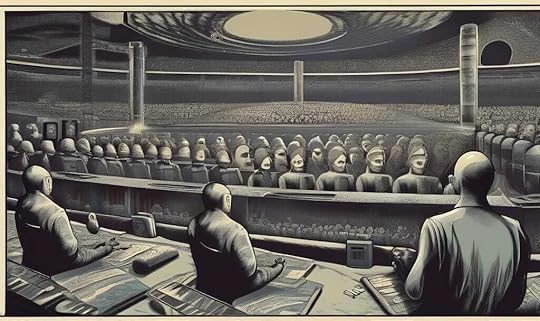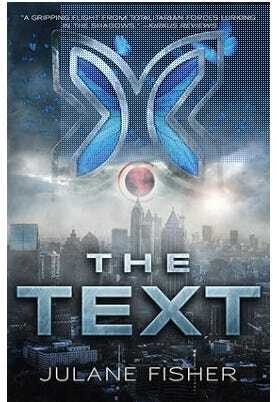T.C. Marti's Blog, page 8
November 8, 2024
An essential list of the warnings listed in The Flight of the Barbarous Relic

If there is something we’ve learned in the 2020s, it’s that the government and their Big Tech henchmen are perfectly fine with suppressing speech and viewpoints that it doesn’t like, often labeling it as ‘hateful,’ or, in some cases, mis, dis, and mal-information.
Back in 2008, when punk rock and wearing shorts that ended just past the knees were cool—just for the record, I still listen to mid-2000s punk (I currently have Simple Plan’s You Suck at Love in my head as I write this) and go out of my way to wear longer shorts—we probably wouldn’t have thought that our own government would go as far as to suppress free speech. Unfortunately, few of us saw that coming, but it seems like George Ford Smith had some foresight.
At least to some degree, as in his libertarian political thriller that primarily focuses on the Fed, one way to suppress not just speech but information came by the means of issuing the Liberty Browser. In case you may not know what that is, it’s the internet browser that our federal antagonists in the book have sold to—a polite way of saying forced on—the masses.
The Libertarian Book Reviewer is a reader-supported publication. To receive new posts and support my work, consider becoming a free or paid subscriber.
And it’s one that would ‘protect people’ from viewing information on websites that didn’t quite fit the browser’s standards. I can literally see this becoming a thing at some point in the not-so-distant future, especially since Big Tech is already about halfway there.
Warnings via George Ford Smith’s The Flight of the Barbarous RelicUsing influential athletes and celebrities to support intense regulationThis one hits home for a lot of us, as it involves using influential figures like athletes and celebrities to ‘sell’ an idea to the masses via the government, whether direct or indirect. When President Maxwell Gage was looking to ‘sell’ the concept of the Liberty Browser, who better to enlist and help out the cause than all-pro quarterback Danny Flynn?
Honestly, I kept wanting to write the name Matt Flynn here, who, following one monster start back in 2011 with the Green Bay Packers, managed to win over just about every NFL franchise that needed a quarterback. While the real-life Flynn flamed out, Danny Flynn was big enough of a name to draw an audience while Gage delivered a speech ‘selling’ Liberty Browser to the nation.
Later in the book, Gage’s Establishment also threw around the idea of filming celebrities installing the latest updates to Liberty Browser.
Overall, if there’s anything we’ve seen utilized more in the 2020s in an attempt to ‘get people’ to do something the government wants them to do, how many times has it turned to athletes and celebrities? Or, even entire sports leagues saying, It takes all of us…
‘Selling’ an idea with benevolent words and sinister intentionsOn the surface, and during President Gage’s speech after he played some catch with Danny Flynn, Gage over-delivered so much that my 17-year-old self (I was 17 back in ‘08) would have been all for this regardless of whether then-President George W. Bush or then President-Elect Barack Obama would have spoken on stage.
Why? Well, Gage equated “a new internet browser that would enforce a commonly accepted set of rules on our surfing experience’ to the Liberty Browser. Basically, Gage sought to protect freedom by introducing a set of rules because “the internet has existed in a state of anarchy, a condition fundamentally at odds with our American sensibilities.”
Sounds great when a President puts it that way, right? Unfortunately for America, it was nothing more than a cover-up for Gage and his administration to put a stranglehold on the former Fed Chairman’s mission to sell the gold standard to the nation by blocking, or censoring, his website.
Lying about history and passing it off as truthI recently read an incredible article by the great Lew Rockwell entitled Why We Need Revisionist History. One reason I love revisionist history is that if we didn’t have what I also like to call ‘thought diversity’ on such subjects, then the Establishment, the winners, or those in control get to tell it.
The biggest warning George Ford Smith gave us occurred in Chapter 20 through a conversation between Gage and one of his advisors. What jumped out at me was the following passage from Gage:
“Compared to the size of government today, what we had then would fit on the head of a pin. And with a pinhead government, society was being swallowed up by the powerful. It came down to a fight between the Morgans and Rockefellers. The money powers controlled everything. Fortunately, we had some intellectuals put a halt to it with progressive social legislation. Government, in other words, needed to grow to stop the Robber Barons. And in growing it found itself incompatible with any semblance of the gold standard. Listen, Stewart—gold can’t support the government we have now. Nothing can. We need massive amounts of debt. Make no mistake, Mathews as a gold proponent is an enemy of the state. If we don’t put a permanent end to this Jolly Roger crap, he’ll bring us down and destroy the common man in our wake.”
Mel Stewart, one of Gage’s advisors and one that he looked down on has an epic counter to the President’s claim.
“Excuse me, Mr. President, but I must respectfully disagree with your history. It was the Morgans and Rockefellers, along with other big names, that pushed for more government-backed cartels and other interventions as a means of protecting their turf against competition. We’ve corralled the fox, but the fox is in charge of the corral.”
Gage’s response?
“Well, whatever the facts are, great sage, big government is here, and we will perish without it. We need to protect our turf from competition, too.”
Clearly, Gage isn’t worried about what’s fact and what’s fiction. He’s only interested in protecting his status and that of big government. To do this, Gage is perfectly fine with passing off the myth of the Robber Barons as fact to preserve the status quo that keeps him and the Establishment, and future establishments in control.
Hop into any college and university, and you’ll see such a myth passed off as fact. I don’t need to link a source to this one since my own sibling and I heard this myth repeated in the same college with the same history professor, a few years apart, mind you. Their first impression of them was this when they came home for the weekend back in 2014: “I think they’re a communist.”
Mind you, this particular relative has never been quite what I call a libertarian, so it speaks volumes.
Ignoring and lambasting reputable works and sourcesThis one was the kicker, as Preston Mathews’ treatise on the overall benefits of the gold standard. While the treatise garnered a few positive reviews, Ford also wrote that “most of the financial commentators followed the government’s cue and ignored Mathews and his book.”
Ford also inserted a list of Establishment figures tossing in their criticisms, such as cultural critics and a Harvard pop psychologist. One would think that something coming from an ex-Fed Chairman would draw nothing but praise from the Establishment and pop culture figures unless that ex-Fed Chairman wrote about something the Establishment didn’t like or could threaten their power in a battle over ideas.
How many times have we seen this one played out recently? Heck, I can’t even erroneously swipe to a headline on my iPhone without seeing CNN, MSNBC, or the HuffPost talk about ‘false claims’ or ‘false information,’ or similar phrases.
Correlations to 2020s AmericaMy motivation for this article came from the one negative review on the book over at Goodreads, in which the reviewer in question stated, “As economics, it a stretch--bordering on conspiratorial. There are much better books to spend my time on.”
The Libertarian Book Reviewer is a reader-supported publication. To receive new posts and support my work, consider becoming a free or paid subscriber.
You can argue that might have been the case back in April 2011 when that review was posted. But I hope that you, after reading this lengthy listicle, could make more than a few correlations that, in 2020s America and in the age of censorship, using celebrities and athletes more than ever to garner support and lambasting works that you don’t like is alive and well in today’s America and across the globe.
November 6, 2024
The Flight of the Barbarous Relic offers an alternative to teach readers about the Fed

For readers who engage in fiction, or mainly in fiction, content about central banking and how it really works won’t reside atop many of their to-be-read lists. As a fiction writer and (primarily) a fiction reader, I can attest that I often absorb nonfiction books about history and economics very, very slowly.
I’m currently making my way through PsyWar: Enforcing the New World Order by Drs. Robert and Jill Malone, and I know a nonfiction book has caught my attention when I’m bull-rushing through 20-30 pages per day. That may not sound like much to the average nonfiction reader, but for me, I’m breaking personal records.
The Libertarian Book Reviewer is a reader-supported publication. To receive new posts and support my work, consider becoming a free or paid subscriber
I also have The Flight of the Barbarous Relic by George Ford Smith on my nightstand and have been attacking roughly 40 pages a day, meaning I’ll have the review up next week. And while I have (slowly) read books like End the Fed by Ron Paul in the past, fiction readers would more likely gravitate toward Ford’s work and as a bonus, gain a little knowledge on the Fed’s shortcomings.
Seeking the truth through fictionAs a libertarian living in a world in which there are very few good works of fiction with such themes, I’m often relegated to seeking them as part of an overall read. For example, I’ve crossed many in the Harry Potter series and other works, like World of the Gateway, Beyond, and the Resistance Series, though the latter two do fall into the libertarian sphere.
Ditto for George Ford Smith’s work which, though action-packed with an actual storyline, provides a more entertaining outlet on what the Fed really is, how it operates, and what makes it the real cause behind inflation, even if those operating it like to pretend otherwise.
It reminds me a lot of Tracy Lawson’s Resistance Series and Kate L. Mary’s Beyond Trilogy, which focuses more on the right to self-ownership while telling a compelling tale through four and three books, respectively.
While knowing one’s natural right to self-ownership is undeniably important, understanding how the Fed truly works against those it purports to “help” is a skill a lot of people fall short in. Survey 100 people in town on what the Fed does, and I guarantee you will get several different answers, with a contingent likely recognizing its inflationary tactics that destroy purchasing power.
Ditto for the origin of money, something Murray Rothbard sums up quite well in his book What Has Government Done to Our Money.
November 4, 2024
The best books ever written may be those you’ve never heard of
 A dusty bookshelf in a 19th-century attic
A dusty bookshelf in a 19th-century atticHarry Potter is one of the best book series ever written and one of my all-time favorites, if not No. 1 on the list. World of the Gateway by EE Holmes, before she brought the series back following Gift of Darkness, clocks in as a close second, and it may even surpass J.K. Rowling’s classic.
Other contenders, like Robert Jordan’s Wheel of Time, C.S. Lewis’ Chronicles of Narnia, George R.R. Martin’s Game of Thrones, and Suzanne Collins’ Hunger Games, each clock in with unforgettable books. Then, there are the classics, like George Orwell’s Nineteen Eighty-Four, Ayn Rand’s Atlas Shrugged, the list goes on and on.
The Libertarian Book Reviewer is a reader-supported publication. To receive new posts and support my work, consider becoming a free or paid subscriber.
We can go back centuries and debate the best book ever written, but these are merely books we know about. The more proper phrase would be, best book(s) ever written that we know about. Because there are hundreds of thousands that have never and may never, see the light of day.
I’ll bet you’ve never heard of…Between August 2011 and September 2012, two things happened. One, I got my first real job at age twenty—sad, I know, but true. Secondly, I transformed from being a strong advocate for far-left politics into something in the libertarian sphere, even if I didn’t become a fully-fledged libertarian until roughly 2021, when I decided to buckle down and gain a better grip on the philosophy or whatever you want to call it.
Anyway, the latter isn’t relevant at this point but the former is, which explains why I’m bringing up this little history lesson. The grocery store that I worked in also happened to employ a former engineer who also wrote a few books.
I’ll give up the name here since you can find Roger Thibault’s work (sometimes) on Amazon, or at least two books - In the Wake of Michael and Rebuking the New World Order. The books are what I would classify as dystopian Catholic fiction, and yes, the content may be discomforting to some who don’t follow the Catholic faith since it resides in the camp of trying to convert those back to the church.
Now, I’m no Catholic, nor do I have much interest in pursuing the faith, and you can describe my religious views as open, take that how you will. It’s not uncommon for me to deck myself out in relics of multiple faiths, and that won’t change any time soon. But the point I’m making is this: In the Wake of Michael was one of the best books I’d ever read, regardless of my own religious views.
November 1, 2024
3 literary classics that helped inspire my dark science fantasy

If there’s one thing I refuse to do here, it’s to talk up my own books unless I’m discussing specific scenes in a neutral way. But I do like talking up inspirations behind my books, especially when they’re rather unconventional.
I’m primarily a science fantasy author, so conventional wisdom says that I like combining science fiction and fantasy reads, like Harry Potter meets A Space Odyssey.
This is correct, but since I want to use my writing to spread the message of liberty while creating what are hopefully entertaining works, it would be foolish to limit myself. Instead, I rolled with a variety of genres that helped me concoct Deceived Mage, including three classics you may know a thing or two about.

So, which books have I read in the past or recently checked out that assisted in the creation of this short novel, as I call the 45,000-word sprint? One of them might just be the best book ever written in American history, although these rankings are subjective. It’s a book you may have come across once or twice in your lifetime.
East of Eden by John SteinbeckI may have started writing Deceived Mage in 2023, but I rolled with the ‘set and forget’ tactic and left the content alone for months. In the interim, I stumbled across the first chapter of East of Eden and was so enthralled I bought a copy on the spot.
Upon finishing the work, I went back and added some of those inspirations into my own, much of which has to do with my main character, Ella Kinnunen's, love for the region in which she lives.
If you’ve ever read East of Eden, John Steinbeck goes into such deep depths regarding his description of and nostalgia for the Salinas Valley that it was something I wanted to replicate with Ella’s thoughts on her home, the Astra Valley.
The Libertarian Book Reviewer is a reader-supported publication. To receive new posts and support my work, consider becoming a free or paid subscriber.
Of course, the work also let me take a significant dive into quite a few of my characters, and that came courtesy of Steinbeck. His ability to seemingly create complexity in Adam Trask, Lee (my personal favorite), Kate, Samuel Hamilton, Cal, Aron, and Abra Bacon (another favorite), just to name a few, was nothing short of ingenious.
Nineteen Eighty-Four by George OrwellYou knew this one was coming, as Nineteen Eighty-Four may be the gold standard for all authors whose themes coincide with libertarianism, whether they realize it or not. I remember reading Beyond the Wall by Kate L. Mary for the first time back in 2021, and the main protagonist, Drea Young, is given instructions to retrieve and read a secret copy of Orwell’s classic.
While Ella doesn’t live in the same totalitarian society that Drea found herself in, there were still similarities between Ella’s situation and that of Winston Smith’s, but at more of a micro level. Yes, society in my work is monitored, with drones keeping tabs on the happenings in the city of Astronova. But we get a deep dive into just how much Ella’s father, Samuli, monitors her.
Sure, there are cameras with facial recognition tech decked out all over the ancient castle in which she lives. But Ella also has to keep an eye out for those pesky Spirit Mages, who can read into one’s vibes and, if they’re powerful enough, their thoughts.
Nineteen Eighty-Four also helped inspire a major scene in Deceived Mage, but I don’t want to give up too much here of what that particular scene is as it’s the ultimate spoiler.
Brave New World by Aldous HuxleyIn Deceived Mage, we got two political parties who have created a landscape much like the one we see in our own world. But Brave New World by Aldous Huxley also played into this with his castes (Alphas, Betas, Gammas, Deltas, Epsilons), as the rival Mercenary and Augury Parties have indoctrinated their followers into not just taking up roles to support said parties but embracing them.
Ella’s servant, for example, mentioned that her family had been proud to serve the highest-ranking members of the Augury Party for centuries. One of the more antagonistic characters in the Mercenary Party mentioned that the Huotaja, those serving as the Mercenaries’ bodyguards who resemble the Undertaker from when he was in his prime, should be sent into a danger zone in her stead.
These bodyguards, all of whom tower over normal men and women, appear to be more than powerful enough to overthrow the bureaucrats they serve. But they instead willfully fall right in line, and the same holds true for the Auguries’ equivalent, the Marsalkka.
The masses, while it seems like they’re out having a good time when they’re not working, have been bound by relentless central planning not just courtesy of one but both parties. Those parties just disagree on how to best go about that central planning, even if they’re more alike than they’ll admit.
Thanks for reading The Libertarian Book Reviewer! This post is public so feel free to share it.
Again, I don’t want to give up any spoilers here, but there’s also one chilling statement in Deceived Mage that drives the point home of just how loyal the masses are to their role in the party. The statement in question wouldn’t have crossed my mind had I not read Huxley’s classic drilling ideas into my brain.
The TakeawayWhile I want to keep helping readers find awesome books that they otherwise may not have heard of like my most recent read, there are times when I want to help authors, and this is one of those posts. The takeaway here is that, regardless of which genre an author writes in, it would be shortsighted if they limited themselves to that genre or genres alone.
All genres will help not only improve one’s writing style but even help inspire different story elements, tropes, deeper characters, and, ultimately, more original work. So, if you’re someone who writes fantasy or, to be more accurate, science fantasy, for the most part, don’t be afraid to pick up that historical fiction novel or a classic like the ones listed above.
The Libertarian Book Reviewer is a reader-supported publication. To receive new posts and support my work, consider becoming a free or paid subscriber.
You might just feel those creative juices flowing from some awesome reads that you may have never seen coming.
October 30, 2024
The Text by Julane Fisher: Full Review

I’ll admit that it’s tough to hold my attention, even as an avid reader. One reason is that many dystopian works like to set a lot, and I mean a lot of exposition, leaving me to think, “Couldn’t you have just shown this through flashback or something?”
Even some of my favorites that I’ll be sharing in later posts do that, but The Text by Julane Fisher wasn’t one of those books. Instead, the old cliche faster than a speeding bullet is an appropriate way to describe the pacing.
That alone gives this book at least a three-star rating. And while I don’t give books star ratings here, those reviews I leave on Goodreads and BookBub have them. But I’d be lying if I said the work’s ceiling was a three-star review because it’s closer to four stars.
The Libertarian Book Reviewer is a reader-supported publication. To receive new posts and support my work, consider becoming a free or paid subscriber.
Yeah, there were some glaring typos that made me double back, action that was mentioned later in the work that seemed to be edited out in previous sections, and some blatant Chat GPT text. Trust me, I’ve tried writing my own work using Chat, so I can list every single redundancy it spits out, even if it’s “smarter” than it was here in late 2024.
Anyway, enough of the overview, let me get to what I liked, didn’t like, and why this is a great work for a libertarian audience, even if I’ve done a few deep dives already.
October 28, 2024
What made Chapter 32 of The Text bone-chilling to the core?

Well, it’s great to be back and writing posts again after having taken Friday off since I spent most of the weekend out of town attending a wedding. It marked my first appearance at one since 2013, and, overall, it was a fun time, even if I’m that guy at the reception who’d rather lurk in the corner and people watch, my face half hidden in the shadows while sipping on my beverage of choice: water.
I know, I’m boring. But I enjoy people watching and always have, something my grandfather was known for when he traveled. While I considered myself not to have had internet access since I don’t trust public Wi-Fi and have yet to pick up a hot spot, and yes, you can scold me for being unprepared, I still got a substantial amount of reading (and proofreading) in.
As for proofreading, it was my dark science fantasy short novel, Deceived Mage, which I think turned out to be a clean read. But trust me, proofreading can get boring, so I dove more into Julane Fisher's The Text and got about three-quarters of the way through the book.
The Libertarian Book Reviewer is a reader-supported publication. To receive new posts and support my work, consider becoming a free or paid subscriber.
As with all my reviews or books that I’m reading and plan on reviewing, I don’t like going into deep detail about what happens in the story since I’m not one to write spoilers. But I will spoil the plot a little on how, once again, Fisher managed to relate the work to real life.
Social Media and PropagandaFrom the COVID crisis onward, not a single one of us is a stranger to social media propaganda and how they’ve suppressed, suppressed, and suppressed some more in the years since. Well, at least until Elon Musk bought Twitter and rechristened it as X, but not before unleashing the Twitter Files and allowing more free speech onto the platform.
Anyway, as I completed reading Chapter 32 of the work, I had to write about it, given the way social media propaganda influenced the plot of this fine novel. I’ll share a snippet in one of the scenes, even if the entire chapter is worth reading. But again, I’m not here to spoil the plot for anyone, and this entire chapter would contribute to that.
But I’ll give a general overview of what makes it so memorable. Finley, Rami’s friend at this point, as it’s unclear what she feels about him, even if she’s interested in some other guy whose name I’ll keep on the down low at the moment, ushered Rami and her friends Lela and Quince (Lela’s boyfriend) from school.
And for good reason, as Finley, using a source whose name I’ll also keep on the down low, was told there would be a bomb threat at their local high school. Well, not a bomb threat, but a news story that there would be a bomb threat, and guess who was getting framed for it?
Okay, fine, maybe I’ll let some spoilers slip when I don’t have a choice, but bad things often happen to protagonists to hold the reader’s interest, right?
Thanks for reading The Libertarian Book Reviewer! This post is public so feel free to share it.
After Finley unveils this little threat, he leads them to an abandoned gas station, where his source is hiding out. That source delivers some chilling information about the Safety Threats and Reinforcement (STaR), plus companies called Centurion (an app provider) and Connect Mobile (a phone service provider).
The Scene in Chapter 32Chapter 32 in The Text and Similarities to Real Life
Finley’s Source: “Three years ago, Connect Mobile hired Centurion to create a social media app called Allicio. Heard of it?”
Lela: “Of course we’ve heard of it. So have two billion other people.”
Source: “Download the app on your STaR-issued device and the Threats Division has every piece of information on you at their disposal. And not just in America, every user worldwide who downloads Allicio has a digital profile to exploit anyone anytime they want. While kids your age love Allicio, some people who remember life before STaR, before President Young, think the app as dangerous.
“Rumblings of a resistance began circulating online, using STaR’s own social media app. The Threats Division tried to shut down anyone spreading disinformation and suppress was what they perceived as propaganda, but TD workers assigned to Allicio are overworked and understaffed. That left space for resisters to communicate and organize.”
Rami: “Organize what?”
Source: “Revolution. STaR needed a way to keep the next generation, your generation, from wanting to overthrow the government.”
Quince: “How are they going to do that?”
Source: “By convincing everyone that they’re safer under STaR’s control. Bifurcation racking, the program my team and I developed, divides individuals into groups based on what they believe. Centurion assumed if we could understand a group’s belief system, we could use that data to either encourage certain content or suppress the posts.”
Rami: “Let me get this straight. You installed a tracker in our phones so you could control our social media?”
Source: “So we can control you. Manipulate what you see on Allicio to encourage you to think a certain way. Gradually change your perspective, leaving you with the impression that STaR wants what’s best for you. Governments of the past often used propaganda to control their citizens. I swear to you I tried to stop the program, but I was too late. The only option was to copy the data.”
While some lines of this scene are just devices for genre fiction—for now, at least—the latter half couldn’t be more familiar to two groups of people: libertarians and conservatives. With COVID, alternative viewpoints such as the lab leak theory were suppressed, while on Twitter, the Hunter Biden laptop scandal was labeled “disinformation” before the Files confirmed otherwise.
Furthermore, Mark Zuckerberg himself came clean and expressed regret for allowing Facebook to suppress information deemed false or misleading, thanks to the Biden-Harris Administration’s pressure to censor content that it didn’t like.
The kicker, however, in The Text is the algorithm, which can suppress anything it chooses, when it chooses. Algorithms, as the Source in the above section claims, can “manipulate what you see on Allicio to encourage you to think a certain way. Gradually change your perspective, leaving you with the impression that STaR wants what’s best for you.”
STaR, a government program, by the way, and the Threats Division, as the Source later said in that scene, “controls Connect Mobile and Centurion.” Sounds like a rather familiar tale, right?
Kind of, anyway, with the federal government in the real world playing the good old hide-behind game, trying to control Big Tech of what to and not to unleash to the public to protect what was left of its own credibility, especially during the COVID crisis.

The same thing was going on in The Text but to a greater extent. The takeaway, for me, at least, is one of many potential drawbacks of what an enlarged, bureaucratic government can and will do to keep its citizens in line to protect itself. Whether that involves protecting its own credibility or spreading to the public what it wants them to believe.
Luckily…for now, at least…Okay, before I go any further, the term, for now, at least, is one that I picked up in the Resistance Trilogy. It has some libertarian leanings, but I’ve always seen K.A. Riley as more of a “left libertarian” at best as opposed to someone from, say, the Austrian camp. That said, I’m overly critical of that trilogy for more than a few reasons, even if Book I, Recruitment, and most of Book II, Render, were lights out.
But once Riley started talking more about climate change propaganda, a kid major general forcing people to eat vegan diets, glorifying altruism, and, later, in the Emergents Trilogy, I was like, “Nope, this one’s an ultimate no-go.” Still, I highly encourage you to read Recruitment, and it remains one of my all-time favorites, as libertarians can get a lot of that one.
Anyway, regarding what I mean by, for now, at least, is that the public’s trust in the media, Big Tech, and many government outlets has dwindled. This is good news because although there’s a secret resistance building in The Text, at least any resistance here doesn’t need to stay so secretive and underground…for now, at least…
Overall, Fisher laid out here what could definitely be the case in the future if our government keeps expanding its draconian powers. While it tried like mad during the COVID crisis, the Hunter Biden fiasco, and even going as far as to label one of the 2024 presidential candidates as a fascist when the other candidate may be far closer to the label, it hasn’t worked. Yet, anyway.
That said, while I’d be one to worry about social media and Big Tech gathering information and data on people that the government can and will use to its advantage whenever it chooses, there’s a little more hope in this world at the moment.
The Libertarian Book Reviewer is a reader-supported publication. To receive new posts and support my work, consider becoming a free or paid subscriber.
So long as people continue to resist Big Tech propaganda and refuse to fall for what it wants us to fall for via suppression and pedestaling specific information, we should be just fine as a society. For now, at least…
Note: Article contains affiliate links.
October 24, 2024
The Text living up to its bidding as a socialist horror story

I retired from being a know-it-all back in 2020, but thankfully, I was never one of those people who were so sure of themselves that I thought central planning was a good idea. Ironically, we saw a lot of central planning back in 2020, and I’ll be the first to say I’m glad to live in a state that, at least somewhat, came to its senses earlier than most.
Anyway, throw in the fact that COVID restrictions and mandates caused more damage than they did to control the damage, among other setbacks, steadily exposed a blueprint of how trying to centrally plan your way out of any situation can and will backfire. Some of us may love nonfiction accounts of the subject, but many others would rather not read what they’d consider dry material.
Thanks for reading The Libertarian Book Reviewer! This post is public so feel free to share it.
You do you, but turning to fiction might just provide an entertaining aspect and one based around, or at least inspired by real-world events. For years, Tracy Lawson’s Resistance Series was my go-to since I stumbled upon it back in 2018, but since I started reading The Text by Julane Fisher, I might just have a new outlet.
Fallacies of central planning are front and center so far in The TextBy Monday, I should have my full review of the work (operating on a very short timeframe this week) but one of the first things that jumped out at me was the outages and blackouts that electric vehicle (EV) charging stations caused.
This one occurred on page seven, so about five minutes into my first reading session, I already had some typing paper out to jot down that note. One I was barely able to read when I confirmed it earlier thanks to my abysmal handwriting.
But it didn’t stop there; from no energy to back up the solar-powered homes to the Safety Threats and Reinforcement (STaR) department tracking one’s movement and health, the fallacies and intrusiveness of central planning have made this one an entertaining read for this libertarian.
And maybe an eye-opener if you’re a pro-central planner looking to take a deep dive into some of its criticisms.
There’s also a lot of cultural critique here if you look hard enough as a reader. Since this book takes place in 2048, I felt rather old when our protagonist, Rami, talked about her love for some early 2000s punk rock bands, noting, and I’m paraphrasing, that artists were rather careful about what they put into song lyrics in 2048.
The Libertarian Book Reviewer is a reader-supported publication. To receive new posts and support my work, consider becoming a free or paid subscriber.
Given the cancel culture plaguing society, I’m not looking too far as to where Fisher got that one. She also clued us in that the Threats Division contained disinformation, something that reminded me a lot of the Biden Administration’s failed attempt at something similar.
Government granting special privilegesWe get a lot of backstory regarding Rami’s testy relationship with her father, and it makes for an enticing subplot. For obvious reasons, I won’t unveil too much here, but we do know that her dad works in government.
That said, he’s got a fancy house, and he can also afford food that is tough to get in this 2048 dystopian world, like pizza. To be frank, I could go a lifetime without pizza, but that’s not the point.
Anyway, some food is outright forbidden, as STaR sees it as unhealthy for human consumption, and the government has replaced it with plenty of genetically modified food - mainly plant-based - instead.
But again, Dad, Rami, Dad’s girlfriend Olivia, and younger brother Zac get to enjoy pizza thanks to the former’s status as a government worker in their tech division.
Some minor criticismsWhile I love the story and themes, I’m not one to give a book a partial review and leave you feeling like I’m showing favoritism because it shines with critiques of central planning. A book, any book, for that matter, will be in my good graces for that theme, I won’t lie, but the writing is very, very clunky and doesn’t always flow well.
I also have zero problems with authors using AI as a way to break through writer’s block and even concoct some sections of their books. I don’t do this with most of my own work because I’m terrible at it. But when one works with AI-based software at times, it’s easy to point out AI content in about two seconds.
Thanks for reading The Libertarian Book Reviewer! This post is public so feel free to share it.
Phrases like constant reminder or weight of the… were just a couple that I had come across multiple times. That said, I wish the work had gone through another edit or two, but given the scope of the story itself, at least these are just minor drawbacks.
October 21, 2024
Rocking and rolling starts to a pair of unorthodox horror stories for spooky season

When you hear the word ‘horror stories,’ something like slashers, psychological horror, the paranormal, or a combo comes to mind. For libertarians, horror almost always comes in a psychological sense, and when we read some literature on the subject, oh, it’s one that will do more than just keep you up at night.
What if I told you one courageous author recently wrote a book on the subject and one that is so terrifying, it puts Nineteen Eighty-Four to shame? I’m talking, of course, about PsyWar: Enforcing the New World Order by Dr.s Robert and Jill Malone.
PsyWar is a real-life horror work that’s perfect for spooky seasonWhile I’m not that far into the work, it’s been a good way to make an hour or so fly by rather quickly, given the lengths those you’ve been taught to trust will go to wage, well, a psywar against you. To the point that your thoughts aren’t even your own and that they’re all a product of what you see, hear, and feel on an emotional level.
If you’ve read Brave New World by Aldous Huxley, you’ll know a thing or two about how this works. Malone talks about entities like the Five Eyes, the 77th Brigade, and the tactics they use to control thought and opinion. Yeah, it’s dystopian fiction come to life.
The Libertarian Book Reviewer is a reader-supported publication. To receive new posts and support my work, consider becoming a free or paid subscriber.
I’ll leave my full review on PsyWar on one of my non-traditional posting days, like a Tuesday, Thursday, or Saturday, since I tend to leave Monday as a time to review fiction books. But since this week and the last have been outliers, I’m simply giving an update of what I’m up to instead. Anyway, speaking of fiction…
Have you ever received a mysterious text…?And someone happens to just follow you around, whether you’re at school, on the road, or even at home? What if this mysterious entity just hid in the shadows, standing far back enough to where you couldn’t catch its face?
Yeah, this is the basis of The Text by Julane Fisher - I think I’ve finally gotten the first name right. This is one of my chosen ‘libertarian onslaught works’ and funnily enough, I’ve had nightmares about this. Like, I’ve either found myself in some mysterious cabin out in the middle of nowhere with people hunting me down, or I’m on the run from a group of people, jumping from home to home, and I have no idea why.
Hey, at least those are just intense, vivid dreams that end up with me waking up with an adrenaline rush. Unfortunately for our main character, Rami, this isn’t the case.
The current vibes…When I was in the sixth grade about a thousand years ago, or maybe it was seventh grade about nine hundred ninety-nine years ago, I read a book (series?) called Chasing the Falconers. And yeah, it’s something I’ll probably review here since it could fit the libertarian concept, even if I’ll need to reread the series since the only memory of the plot I have is that someone was after the co-protagonists.
Anyway, it’s the vibe I’m getting with The Text, and to be frank, if I didn’t have to get up at 3:00 AM this morning and 2:30 AM tomorrow, I’d have no problem staying up all night and reading it.
The Libertarian Book Reviewer is a reader-supported publication. To receive new posts and support my work, consider becoming a free or paid subscriber.
So, once everything calms down in the first of November, I’ll have a full review of PsyWar and The Text, and maybe some insights on Chasing the Falconers. In all, I can’t freaking wait.



